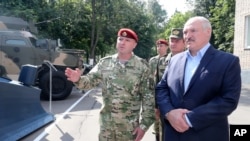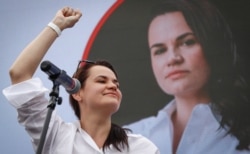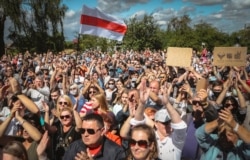Belarusian President Alexander Lukashenko announced he had tested positive but successfully overcome the novel coronavirus on Tuesday — adding a new twist to a charged presidential election season in the former Soviet republic often called the “last dictatorship in Europe.”
Lukashenko, 65, revealed the news during a speech before Interior Ministry troops in Minsk — with the longtime Belarusian leader speaking in a hoarse sounding voice he blamed on a recent heavy workload.
"I apologize for my voice. I have to give a lot of speeches lately,” said Lukashenko.
“But, more surprisingly, you are now meeting with a person who has managed to come through the coronavirus on his feet. That is what doctors concluded yesterday. I was asymptomatic.”
The Belarusian leader did not clarify when he became ill or provide access to his doctors. Observers noted that Lukashenko’s schedule never abated from scheduled meetings in recent months.
Nor was he ever seen wearing a mask or taking other health precautions to avoid infecting others around him.
A Race Unlike Any Other
His admission that he tested positive for the virus comes as Belarus enters a fraught presidential political season that has seen the imprisonment of rival would-be candidates and the emergence of their wives as stand-ins who are now attracting throngs of followers.
Svetlana Tikhanovskaya — whose husband, the political blogger Sergei Tikhanovsky currently sits in jail on what she says are trumped up charges — has emerged as the opposition's lead candidate and a political star by taking direct aim at what she says is Lukashenko’s legacy of repression.
“Yes, I was scared at first,” she said in her first televised speech. “I know what depths this government can go to in order to preserve its place. But I am no longer scared.”
Protests against the government have been met with brutal police force and arrests of demonstrators and journalists. Since May, more than 1,000 people have been detained by police, according to the Vysna Human Rights Center.
Tsikhanovskaya says she has ferreted her young children out of the country amid government threats as she has embarked on her campaign.
What Virus?
But Lukashenko’s announcement that he tested positive for the coronavirus — and breezily survived —- also again highlighted the Belarusian leader’s controversial attitude towards the global pandemic.
Indeed, as COVID-19 has infected millions worldwide, Lukashenko has dismissed fear of the virus as mass "psychosis" — a minor health issue he has said could be easily cured with a shot of vodka, a hot sauna, or doing farm work or strenuous exercise.
As much of the world shuttered its economies to stamp out the virus, Lukashenko ordered that life in his country go on as usual.
Belarus’ national soccer league continued to play throughout the spring. Schools were opened after a short delay. A mass Victory Day celebration to mark the 75th anniversary of the Soviet Union’s defeat of Nazi Germany went off as scheduled in May. Participation by government employees was in some cases mandatory.
Official statistics show Belarus with nearly 70,000 infections and just over 500 deaths.
Government critics argue those figures far underrepresent the real number of cases.
“It’s hard to convince someone a disease isn’t scary if it killed your relative. It’s hard to convince someone life is good when you’ve lost your job due because the coronavirus is affecting the global economy,” says Andrej Stryzhak of #ByCovid19, a volunteer group that has emerged to help doctors and hospitals deal with the pandemic.
Civil Society Surge
Lacking federal support, Belarusian civil society has rallied to address the health crisis.
Volunteers have raised money to buy personal protective gear for hospitals and schools. Restaurants have donated food. Hotels provide rooms pro bono to medical workers. Private businesses have contributed funds.
That collective activism has now shifted to politics ahead of the August 9th election, with volunteers helping to organize rallies, spread campaign information, and sign up as election monitors for the vote.
“The coronavirus has strongly influenced how Belarusians look at the vote,” says Stryzhak of #ByCovid19 in an interview with VOA.
“Now people are taking matters into their own hands. Belarus has awakened.”
In turn, Lukashenko has claimed nefarious outside forces are staging a street revolution that would inflict chaos on a country of 9 million that he alone has ruled since the breakup of the Soviet Union in 1991.
In what some observers saw as an ominous sign, the Belta state news agency reported security services had detained 32 "foreign mercenaries” on Wednesday, without elaborating.






